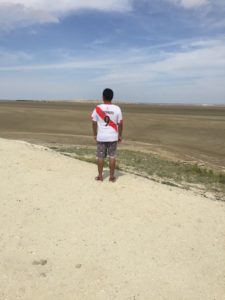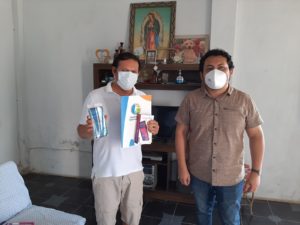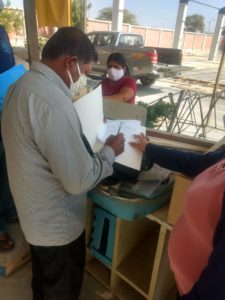Delivering computer tablets to a rural area in northern Peru in times of a pandemic, Oliver Calle and Nina Laurie

Last week it was announced that the UK will be leading in post-El Niño Costero reconstructions in Peru https://elcomercio.pe/economia/peru/reino-unido-le-agradecio-al-peru-por-elegirlo-para-efectuar-las-obras-de-reconstruccion-con-cambios-nndc-noticia/. In the same week, Oliver Calle, the Peru-based coordinator for the ‘Farming and Fishing in the Desert’ AHRC and SFC GCRF funded research project http://impact.wp.st-andrews.ac.uk/fishing-and-farming-in-the-desert/oversaw the handover over of 12 computer tablets to students and families from Daniel Alcidez Carrion school in Mala Vida, Sechura. Oliver is based with NGO project partner PRISMA http://www.prisma.org.pe. Phones were originally included in the project design as a way to enable students to record inter-generational oral histories about El Niño experiences over the years. Lockdown, because of Covid-19, changed the team’s plans and now, as a result, project-issued tablets have replaced phones. The tablets will provide a vital means of facilitating students’ access to online materials and will enable them to work with their teachers for the first time since December 2019, when the last school year ended. Pictured with Oliver Calle (left) is the Principal of Daniel Alcidez Carrion, Lic., Roberto Sojo, who himself only recently recovered from the Corona Virus.

In what follows, Oliver, who is based in Sechura, Piura, northern Peru, recounts in more detail the reality of what such an, albeit small, achievement involved in the context of lockdown. The tablets were bought in Lima 7th May 2020 and were finally delivered to the students in Mala Vida, a desert community in Piura 22th of June, more than a month after the initial purchase.
After they were first bought, the tablets and SD cards were sent without sim cards from Lima to Piura, because the phone company policy meant that they could only sell sim cards to another company and deliver them to the buyer’s office. However, the problem was that the government had decreed that all companies were required to work from home during that period of time. Still, we needed the sim cards so the students who are participating in the project could have access to the internet and cellular network given that they would no longer be able to meet with us or even their Principal or teacher on a frequent basis.
The tablets and SD cards arrived in Piura about a week later. Two people from PRISMA then had to travel the hour and a half to Piura to get them. They had to wait in huge queues because a large number of people were escaping Lima for Piura because of Covid 19 and were sending their belongings via bus cargo services. After receiving the tablets and SD cards in Sechura, we realized that the SD card provider had made a mistake and had sent us a different type of SD card, one that could not be used with the tablets and so they had to be returned. We, therefore, decided to give the SD cards to the students at a later date because the process of returning and changing them was going to take weeks and it would be better to do it once the situation improved.

Following the collection, we had to fully prepare the tablets for delivery to the students along with the necessary documentation. In this case, apps such as Zoom and WhatsApp were installed because our oral history workshops would now need to be conducted through Zoom and general communication would need to take place through WhatsApp. Meanwhile, as we were still waiting for the sim cards to be bought and sent from Lima, we decided to give two of the tablets to the Principal and a teacher to use without sim cards because they had WiFi in their homes. We took this decision in the hope that they could familiarized themselves with the hardware and warn us if anything was malfunctioning. In this way, they could start working and coordinating with the project.
However, despite all these evolving plans, progress was further halted because a couple of days prior to going to Catacaos, where the Principal and teacher live, the Principal came down with a high fever and was suspected of having Covid-19, so we had to wait. At the same time, the number of cases in that place were growing exponentially, and we were advised against going there at all. Everyone was scared.
When PRISMA was finally able to buy the sim cards in Lima, waiting for them to arrive got even more complicated. At first, PRISMA sent the sim cards via a large Peruvian cargo company. However, after PRISMA gave them the sim cards, one of Olva’s workers got Covid, so the whole company had to be temporally closed. No deliveries were going to be made for a while. When PRISMA tried to get the sim cards back, so they could send them with another company, the courier told them that the just seeing about the possibility of delivering them back would take 72 hours, and there was no assurance that after those 72 hours PRISMA would be able to actually have the sim cards back. Even if they could, we would still have to wait another 4 days for the sim cards to arrive in Piura. Thankfully, the option of buying new sim cards in Piura arose and, in this case, only an hour drive would be needed to bring them back to Sechura. Despite this hopeful option, the day that two people from PRISMA went to Piura to buy the sim cards there (which is quite a process because of the transportation issues; basically, you need to have transport permission and need to be in a category considered as essential worker and then apply for permission for yourself and a driver), a new problem arose. During the sim activation process, the whole network basically collapsed (probably due to high use) and we could not activate the sim cards. The phone company has a policy to only sell activated sim cards when it’s a company purchase, so our PRISMA collegaues had to come back empty handed. They finally got the sim cards on a second visit to Piura a few days later. As soon as the sim cards arrived in Sechura, we installed them and tried them out one by one. At last, everything was finally ready.
Thankfully, by this point, the Principal of Daniel Alcidez Carrion school had recovered. We knew that the only way we could deliver the tablets to students was with his help because most of the roads, including the road to the school, were blocked by locals who were not letting anyone through due to Covid-19 concerns. I travelled with a psychologist working at PRISMA who had all the necessary permissions to get his car on the road. He was going to Piura to pick up other things and was able to take me to Catacaos.
We finally delivered the tablets to the Principal who also told us about the problems that he would face getting the tablets to the school due to the lack of transportation. It was on Sunday when he was finally able to confirm that he and the the social studies teacher would be able to travel to the school, the next day, Monday, to deliver the tablets to the parents and students. The parents were going to be in the school anyway to receive donated food baskets with vital goods that I later also got the opportunity to help out with. Thankfully, the people doing the blockades knew the Principal, and because Principals are seen as authority figures, they let him and the car pass. Finally, the handover of the tablets happened at 10:30 am on Monday morning. I managed to be there thanks to a PRISMA colleague who had asked me to drive into the desert to deliver some donations of foods and goods for various people there. They were going to wait in the desert schools for the delivery -and when I say desert, it actually is a desert, there are schools in the middle of the desert surrounded by sand. This delivery was due to take place with another organization and a local municipal government committee. It was only thanks to this municipality delegation that I was able to pass through the blockades driving the car, which was carrying about 63 of the baskets, along with two more collegaues from PRISMA who were also in charge of the donations events in various rural areas. Coincidentally, and thankfully, Daniel Alcidez Carrion in Mala Vida was one of the schools, so finally we arrived just in time. I was able to be there with the Principal and teacher for a moment before I then had to leave again with the committee to travel to a different community further away across the sands.
By Oliver Calle, PRISMA (http://www.prisma.org.pe) and Nina Laurie University of St Andrews. 25th June 2020
